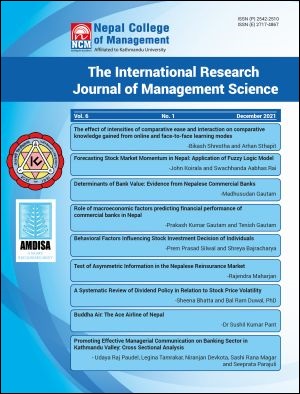The effect of intensities of comparative ease and interaction on comparative knowledge gained from online and face-to-face learning modes
DOI:
https://doi.org/10.3126/irjms.v6i1.42332Keywords:
comparative knowledge gained, comparative ease, comparative interaction, face-to-face learning, online learningAbstract
The paper examined the effect of varying intensities of comparative interaction level (CIL_L) and comparative ease of attending online classes (CE_L) (viz., high, and low) on comparative knowledge gained from online and face-to-face learning modes, and existence of differences on the effect across two intensities of the covariates. Based on complete enumeration of the population of 224 management students attending the online classes at Nepal Open University, Nepal (from 22nd February to 29th March 2020), the study— by employing a binary logistic regression model— discovered the effect of comparative interaction level and comparative ease of attending online classes as significant on the comparative gain of knowledge. Further, the study found that the effect of low intensities of comparative ease of attending online classes (CE_L) and comparative interaction level (CIL_L) are lower than high intensities of comparative interaction level and comparative ease of attending online classes in finding the online classessimilar/superior as opposed to the face-to-face classes. The findings should be instrumental to the exploration of the potential pathways to ameliorate the virtual learning mode as an alternative to the face-to-face one in Nepalese higher education regime.




